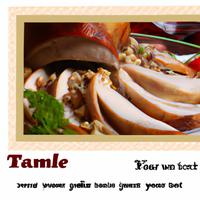
1 serving (100 grams) contains 135 calories, 30.0 grams of protein, 3.5 grams of fat, and 0.0 grams of carbohydrates.

Log this food in SnapCalorie

Nutrition Information
Calories |
321.4 | ||
|---|---|---|---|
% Daily Value* |
|||
| Total Fat | 8.3 g | 10% | |
| Saturated Fat | 2.4 g | 12% | |
| Polyunsaturated Fat | 0 g | ||
| Cholesterol | 166.7 mg | 55% | |
| Sodium | 119.0 mg | 5% | |
| Total Carbohydrates | 0 g | 0% | |
| Dietary Fiber | 0 g | 0% | |
| Sugars | 0 g | ||
| protein | 71.4 g | 142% | |
| Vitamin D | 0 mcg | 0% | |
| Calcium | 35.7 mg | 2% | |
| Iron | 2.9 mg | 16% | |
| Potassium | 569.0 mg | 12% | |
* Percent Daily Values are based on a 2,000 calorie diet. Your daily values may be higher or lower depending on your calorie needs.
Food Attributes
Source of Calories
About Turkey cooked
Turkey, cooked to succulent perfection, is a protein-rich meat often enjoyed across various cuisines, particularly in American and European traditions. Originating as a staple in festive meals like Thanksgiving, turkey is versatile in its preparation—roasted, grilled, or smoked—offering a leaner alternative to red meats. Packed with essential nutrients, cooked turkey contains significant amounts of B vitamins, selenium, and zinc, which support energy metabolism, immunity, and overall health. Its low fat content, particularly in the breast meat, makes it an excellent choice for heart-conscious diets and weight management. However, darker meat or skin may have higher fat levels. Some preparations, such as heavily salted or processed turkey, can increase sodium intake, making moderation key. When cooked thoughtfully, turkey can be a balanced and nourishing part of any meal, blending well with herbs and seasonal accompaniments for wholesome flavor and nourishment.



